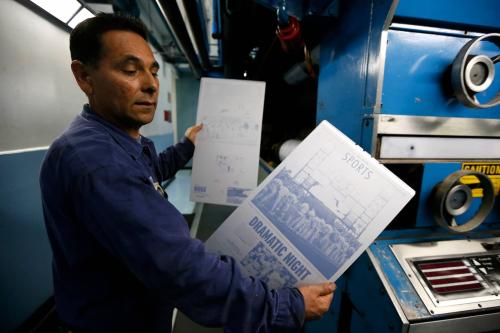

9:30 am EDT - 12:30 pm EDT
Past Event
Content from the Brookings Doha Center is now archived. In September 2021, after 14 years of impactful partnership, Brookings and the Brookings Doha Center announced that they were ending their affiliation. The Brookings Doha Center is now the Middle East Council on Global Affairs, a separate public policy institution based in Qatar.
The Brookings Doha Center hosted a roundtable discussion on media freedom in the Middle East and North Africa (MENA) on May 13, 2018, under Chatham House Rule. The discussion brought together a group of media experts from academia and media networks with the purpose of finding constructive solutions and policy recommendations that can help support media freedom, journalists, and human rights in the MENA region. While signs of reform do exist, this region continues to be one of the most dangerous for journalists.
One of the reasons that media oppression exists is that elites, especially after the Arab Spring, have realized how media threatens their authoritarian rule. Oppressive regimes do challenge the media through various propaganda mechanisms, and this can be an efficient way to thwart transparency and critical reporting. Firstly, democratic values must be brought to these countries. The second solution is to fight for the independence and freedom of media in the region through recruiting people who believe in the role of media and its mission, teaching and training journalists on how to protect themselves, and making people aware of the importance of media and the danger of media oppression.
Countries like Morocco and Tunisia have experienced some periods of openness with regards to media freedom, especially in the aftermath of the 2011 uprisings. One of the most significant challenges to media freedom throughout the region, and especially in these two countries, lay in the question of ownership and advertising. The media landscapes are deeply influenced by political and financial elites who maintain monopolies over outlets and the advertising sector. This leads to a deeply politicized, biased, and propaganda-based content flow.
Since 2011, the propaganda wars between essentialist binaries, such as the Islamist-secularist cleavage, have particularly intensified. There is also a lack professionalism and journalistic training in both countries. States also attempt to restrain journalists and activists through increased surveillance, such as in Morocco. There are some cases of successful lobbying efforts to free journalists, or to ensure they have access to a press card, but these are few and far between. This is why a legal framework that protects journalists is essential; more transparency about media ownership is necessary to curb the monopoly of certain elites; finally, better business models with diverse arrays of funding, outside of the state, and a larger number of shareholders, also represents a significant step to curb the elite and state control over media.
Since the Arab Spring, three things have resulted from the control of free media. The first is a move away from corporate to citizen media. The two main tactics used by governments are oppression (cracking down of activists) and governmental influence over social media. Smaller media outlets and networks owned and controlled by the government are exerting influence on social media platforms through consultancy firms and security agencies. Polarization within real media, started during the Arab Spring, has increased. This is also the case with international media and the ability of Gulf states to influence international media through financial means.
One of the defenses of media is credibility, professionalism, and objectivity. Another strategy to ensure media freedoms are protected is to promote media solidarity campaigns, where media outlets come together. An example of this is when Al Jazeera was having problems with coverage in Egypt, and a CNN correspondent did a report for Al Jazeera. Another example was the campaign, “Journalism Is Not A Crime,” which was launched by Al Jazeera and supported by other media outlets.
Another potential recourse mentioned was the concept of regional courts. It could be a possible remedy for protecting journalists, along the model of the European Court of Human Rights. In 2014, there was an effort to establish an Arab regional Human Rights court, though its main reservation was the lack of an individual complaints mechanisms. While courts could be a solution to the problem, it must be a regional court that has individual complaints mechanisms which enable individuals to complain directly to the court. However, such a scenario is very unlikely. The international human rights system is unfortunately inefficient in dealing with media freedom issues.
The speakers mentioned various countries and cases of direct and indirect repression over the media. The example of Egypt especially demonstrates direct governmental oppression. Monopolization of major media in the hands of the United Arab Emirates and Saudi Arabia is also a big concern for press freedom in the region. The fragility of governments in the region has been exposed, and they feel an urgent need to protect themselves from the people and journalism. In order to protect journalists, and to free imprisoned journalists, international lobbying efforts and campaigns provide an effective tool. For example, Al Jazeera network and its human rights department has been active in promoting the case of Mahmoud Hussein and lobbying diplomats, politicians, and NGOs to raise the profile of the case.
During the two roundtables speakers made the following recommendations:

Jonathan Katz, Lily Conway, Norman Eisen, Robin J. Lewis, Andrii Borovyk, Josh Rudolph
April 19, 2024

Elaine Kamarck, Jordan Muchnick
April 19, 2024

Courtney C. Radsch
March 25, 2024